
Cashing Out: Win the Wealth Game by Walking Away
by
Julien Saunders
and
Kiersten Saunders
Published 13 Jun 2022
As one of only a few working, professional Black women during that time, her mother fought through her own set of experiences and managed to retire early at the age of fifty-five. Having seen this example up close, Purple was well primed to deal with workplace dynamics and knew that at a minimum a similar retirement age was possible for her. But after years of savvy job-hopping and frugal living, she very quickly realized she could do it much sooner. “Watching my mom, she’d already told me what was going to happen,” Purple told us. “Your boss is gonna come in; they’re going to pay you a little bit and make you do everything. Seeing and hearing her distaste for it . . .
…
Even after doing this and hitting all her performance metrics, she was refused a promotion and told by her senior VP, “You’re not ready.” Discouraged and disillusioned, Purple decided to play the game to her advantage. Instead of staying in a particular role or with a company under the assumption that her hard work and loyalty would eventually be rewarded, she changed her approach. “I job hopped. For a while, I moved every year, and with almost every move I’d earn another $20,000. Why would I stay in one role doing the same work when someone else that I’ve only known for an hour in an interview is telling me they’ll pay me more to do it for them?” Purple told us. But that wasn’t all.
…
While she didn’t take the entrepreneurial, real estate, or side-hustle route, she doubled down on her relentless discipline. Instead of finding or developing the next big idea, she simply poured all of her extra time into minimizing her spending. She was also willing to break social norms and common career advice by routinely job-hopping and effectively used that tactic to grow her income significantly over a focused period of time. All of this enabled her to funnel all discretionary income into her retirement portfolio and reach her target retirement number well ahead of schedule. And while her professional career didn’t even last fifteen years, she embodies what the last phase of the fifteen-year career should look like: discipline, trusting the process, and focusing on the things you can control.
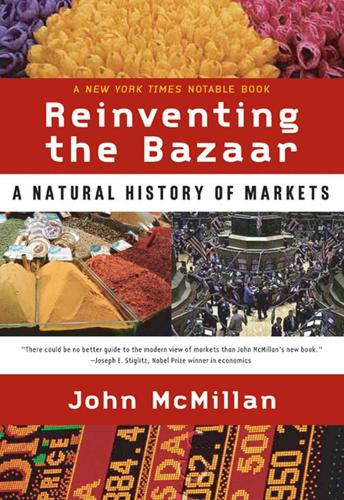
Reinventing the Bazaar: A Natural History of Markets
by
John McMillan
Published 1 Jan 2002
Each wants to prove how smart he or she is, so that when the other company has a job vacancy—which could be in the near future—his or her name will come up. “The network in Silicon Valley transcends company loyalties,” said another manager. “I have senior engineers who are constantly on the phone and sharing information with our competitors.”11 Thus, both the job-hopping and the prospect of job-hopping cause ideas to flow across firms. The Silicon Valley computer technologists followed the maxim Seneca had promulgated two thousand years earlier: “The best ideas are common property.” Why did the Silicon Valley labor market develop a culture of sharing while in Route 128 there was a culture of concealment?
…
A Silicon Valley employee has no such fear. The job-hopping that has driven Silicon Valley’s success arguably traces back to California’s weaker protections for intellectual property. A covenant not to compete, like a patent, is a legal restraint on trade. Massachusetts law, by enforcing it, encourages a firm to innovate by granting it property rights in its employees’ innovations, at the cost of preventing employees from seeking better jobs and inhibiting the usage of existing ideas. Not enforcing it, as in California, has the opposite effect. The spreading of ideas through job-hopping is not in the interest of the firm that does the innovating, for it dilutes the firm’s returns.
…
Unencumbered by tradition, Silicon Valley developed a culture of open relationships between employees of competing firms. Ideas were freely exchanged. Engineers changed jobs often, and no one disapproved if they took what they learned in the old firm to the new one. Massachusetts was more hidebound. Loyalty to the company and long-term employment were valued. Ideas were tightly held within firms. The job-hopping in Silicon Valley is frenetic. Engineers average a short eleven months in any one job (compared with the three years’ job tenure of the average American). “The mobility among people strikes me as radically different from the world I came from out East,” remarked a Silicon Valley manager. “There is far more mobility and far less real risk in people’s careers.”

The Revolt of the Public and the Crisis of Authority in the New Millennium
by
Martin Gurri
Published 13 Nov 2018
Manifiesto “Democracia Real Ya.” http://www.democraciarealya.es/manifiesto-comun/. McEwan, Melissa. “President Obama at Planned Parenthood.” Shakesville, April 26, 2013. http://www.shakesville.com/2013/04/president-obama-at-planned-parenthood.html. Meister, Jeanne. “Job Hopping Is the ‘New Normal’ For Millennials: Three Ways To Prevent a Human Resource Nightmare.” Forbes, August 14, 2012. http://www.forbes.com/sites/ jeannemeister/2012/08/14/job-hopping-is-the-new-normal-for-millennials-three-ways-to-prevent-a-human-resource-nightmare/. Milbank, Dana. “Obama, the uninterested president.” Washington Post, May 14, 2013. http://www.washingtonpost.com/opinions/dana-milbank-obama-the-uninterested-president/2013/05/14/ da1c982a-bcd7-11e2-9b09-1638acc3942e_story.html.
…
[153] Duncan Watts, Everything Is Obvious, Once You Know the Answer: How Common Sense Fails Us (Crown Business, 2011), Kindle location 3312. [154] Taleb, Antifragile, 8. [155] Ibid., 126. [156] Jeanne Meister, “Job Hopping Is the ‘New Normal’ For Millennials: Three Ways To Prevent a Human Resource Nightmare,” Forbes, August 14, 2012, http://www.forbes.com/sites/ jeannemeister/2012/08/14/job-hopping-is-the-new-normal-for-millennials-three-ways-to-prevent-a-human-resource-nightmare/. [157] Thomas W. Benson, Writing JFK: Presidential Rhetoric and the Press in the Bay of Pigs Crisis (Texas A&M University Press, 2004), 39
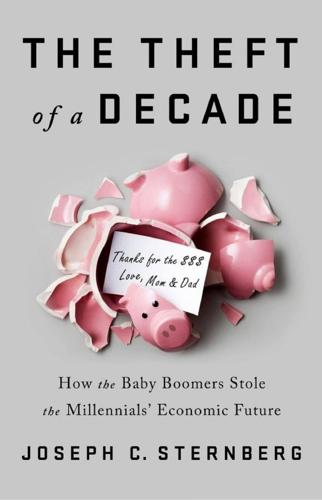
The Theft of a Decade: How the Baby Boomers Stole the Millennials' Economic Future
by
Joseph C. Sternberg
Published 13 May 2019
Declining job openings in general and increasing skill requirements led to another worrying trend that afflicted Millennials in the rapidly polarizing post–Great Recession labor market: we didn’t change jobs as much as young adults usually do, because we weren’t confident we’d end up keeping a new job if the employer downsized. Young workers are particularly prone to job hopping. It’s how they figure out what they’re interested in and what they’re good at, how they start acquiring skills and work experience, and how they move up the salary ladder, given that the biggest wage jumps come from finding a new job rather than waiting for your current employer to give you a raise.
…
Around 80 percent of late-Boomer Japanese men were in regular work by their thirties, compared to 70 percent of thirty-something Millennials now.40 Anecdotally, growing numbers of young men report being shunted into the nonregular segment of the labor market, especially since the global financial crisis and recession of 2007–2009.41 That’s because Japan’s economy still struggles with the legacy of a lifetime employment system that is further and further out of touch with the demands of a modern economy. For the first several decades of the postwar period, Japanese jobs were for life. Workers would accept lower salaries than their foreign peers, but in exchange their companies would implicitly promise never to lay anyone off and to provide generous pensions. Workers themselves would avoid job hopping in search of higher pay elsewhere. Some of this was enforced by law—especially Japanese laws making it harder than in many other developed countries to fire workers, and courts that are especially likely to force companies to rehire workers deemed to have been unfairly dismissed. But a lot of it was cultural.
…
See GDP (gross domestic product) Gurner, Tim avocado/coffee and, 1, 2, 3 homebuying and, 116 inheritance, 4 Hamilton, Alexander, 147, 147n, 148 Hammond, Darrell, 153 Harris, Kamala, 214 Hawley, Josh, 212 HCAI (Housing Credit Availability Index), 139, 139n health care electronic medical records, 235 See also Affordable Care Act/Obamacare; health insurance health insurance economic security and, 65 employer-based insurance/history, 65, 66 See also Affordable Care Act/Obamacare Hillbilly Elegy (Vance), 45 HOLC (Home Owner Loan Corporation), 119–120 Home Owner Loan Corporation (HOLC), 119–120 housing amortizing mortgage, 120, 120n balloon loans, 119 Boomer ownership, 109, 110, 111 Federal Reserve/mortgage lending and, 61–62 GI Bill and, 120 Great Depression/government response and, 119–121 history, 113–114, 114n, 118–119 Millennial home ownership/education debt and, 94–95 mortgages/taxes and, 120, 126, 127 multigenerational households, 112, 113 ownership value debate, 120n postwar boom and, 121 Housing Credit Availability Index (HCAI), 139, 139n housing/financial crisis bailouts, 130, 130n, 132n bank liquidity and, 129–130 Boomers and, 134, 135 description/consequences, 128–129 foreclosures and, 111, 132, 132n, 135 home equity increase and, 125–128, 126n home equity loss and, 10, 110–111 home ownership decline and, 121, 122 homeowners “lock-in” and, 136 housing debt/policies, 123–127, 125n insolvency crisis and, 129–130 interest rates and, 124–125, 125n, 127–128, 136 managing policies, 129–137 Millennials and, 131, 135–140, 141–143 mobility and, 135–136 mortgage-backed securities (MBS) market and, 124, 125n, 128, 129 mortgage security and, 122–124 press release/beginnings, 128 quantitative easing, 133, 135, 136, 137 quantitative easing dollar amount, 137 regulations following/Millennials and, 137–140 subprime/prime borrowers and, 126–127, 126n housing/Millennial issues economics and, 17, 110, 111, 112–113 expectations, 109–110 living with parents/statistics, 111–113, 114 locations/job locations and, 116, 117–118 multigenerational households, 112, 114n ownership/demographics, 115–116 renting/costs and, 113, 113n, 114, 114n, 141–142, 141n starter homes and, 116, 117 supplies and, 116–118 Howe, Neil, 6–7 HUD (Department of Housing and Urban Development), 123 Iceland and financial crisis, 180 immigration Millennials views, 218, 225–226 Trump, Donald and, 225–226 Immigration and Customs Enforcement (ICE), 211 India, 178, 201 Industrial Revolution, 113 information/computer technology rise, 56, 235 inheritances/Millennials beliefs/estimates, 103–104 Boomers life expectancy/health care finances and, 104–105 feudalism/history and, 106 Fidelity surveys, 105 Millennials retirement and, 107–108 timing and, 105–106 interest rates Bush and, 57 Federal Reserve and, 18, 19, 124 housing/financial crisis and, 124–125, 125n, 127–128, 136 Trump and, 19, 231–232 International Monetary Fund (IMF), 182–183 internships/Millennials numbers, 31 Obama and, 73 overview, 31, 72–73 pay and, 31, 72 work descriptions, 32 investment Boomers childhood and, 49 consumption relationship, 50 costs of labor vs. capital, 63–64, 65–66, 229 during Bush administration, 57 during Reagan administration, 53, 54 fixed investment, 49, 51, 53, 56, 57, 60, 127 growth (mid-twentieth century), 49 need to increase and, 15–17, 51 productivity and, 16, 49 technologies replacing labor and, 62–63 investment-and-productivity boom (1950s/1960s), 49–50 decline (1970s/1980s), 50 Ireland and financial crisis, 180 Italy Millennials and, 184, 201 temporary work, 184 Jackson, Alphonso, 123 Jackson, Andrew, 147 Japan consumption tax, 206 corporate scandals, 202, 202n debt, 205–206 demographic boom, 203n economic growth (1960s/1970s), 201–202 population trend, 207 working mothers and, 209 Japan Millennials delayed marriages/children and, 208–209 economy and, 203, 205, 206–207 inflation and, 207–208 interest rates and, 207–208, 208n job/training investments and, 204–205 lifetime employment deal and, 203–204 regular/nonregular work, 202–203, 202n taxes and, 205 Jeffersonians, 147n job hopping, 37–38 “jobless recovery,” 35, 69 jobs/job market and Millennials age of employee/job losses, 35–39 Boomers vs., 27, 46 company size and, 38–39 economists categories of jobs/job losses and, 33–34 experience requirements and, 37 financial crisis/recession losses distribution, 32–37 “fun/fulfilling” work and, 29 goals/dreams, 31 job losses by skill level, 34 job opportunity losses/time effects, 39–40 jobs replaced by robots, 34, 34n lower-skilled/low-paying employment replacements and, 36–37 mentors vs. bosses, 29–30 overqualification and, 42–43 pay/job losses and, 33–34 recovery from financial crisis and, 35, 59 statistics on white/blue collar jobs, 28 transformed jobs and, 27–29, 27n wants description, 29 See also specific components Johnson, Lyndon, 149 Kander, Jason, 212 Keynes, John Maynard/Keynesian economics, 50n, 58, 163n Kotlikoff, Laurence J., 171–172 labor capital vs. labor costs, 63–64, 65–66, 229 costs, 65–66 costs (by 1990s), 55 replacing labor and, 17, 34, 34n, 62–63 See also union power labor-force participation rate in 1970s, 47 in 1980s, 54 description, 30 Millennials/post-2008 decade, 30–31 labor productivity complementary technologies and, 49 definition, 48n labor hours and, 49 output per hour worked and, 48, 48n, 56, 57 labor share in 1950s/1960s, 47, 50 definition/description, 47 during Clinton presidency, 56 during Reagan presidency, 56 economic theories on, 62 trend past 50 years, 62 Lehman Brothers, 11, 129, 133 Libertarian candidates, 219 McAfee, Andrew, 41 McCain, John, 225 McCain, Meghan, 215 Maloney, Carolyn, 219 Manhattan Institute for Policy Research, 58 ManpowerGroup, 31 manufacturing economy (US) decline, 12, 14 description, 15–16 MBS (mortgage-backed securities) market, 124, 125n, 128, 129 Medicaid Affordable Care Act and, 167 financial problems, 156 role, 149 Medicare for all Americans, 211 financial problems/Millennials and, 153–161 inflation and, 169 insurance comparisons, 154 Millennial resources and, 142 role, 149 See also entitlements for elderly Medicare Part D, 157 Merkel, Angela political party/government and, 197, 200, 200n taxes and, 197 Merrill Lynch, 11, 128–129 Merrill Lynch survey/savings, 78 military spending deficit spending (government) and, 151 generational fairness and, 171 Millennials avocado/coffee debate, 1–3 childhood diseases and, 3–4 definition/description, 5–9, 237 diversity and, 216, 237–238 ethnicity, 9 as immigrants/children of immigrants and, 8–9, 112 material well-being and, 3–5 navigators and, 21–23 numbers, 8 parents/security and, 3–4 as “retirement plans” for parents, 145 second language and, 8 sex and, 217 social questions, 216–217 stereotypes and, 1–3, 29–30, 235 term origins, 6 views of, 1–3, 4–5, 26–27 wars and, 4 minimum wages debates/views on, 185 Europe, 183–184 in US, 183–184 Mondale, Walter, 20 mortgage-backed securities (MBS) market, 124, 125n, 128, 129 Mortgage Servicing Assets (MSAs), 138n Mulligan, Casey B., 165 Murphy, Patrick, 212 National Center for Education Statistics data analysis, 92–93 National Football League union refs lockout (2012), 49n National Home-ownership Strategy (1995), 123 navigator Millennials, 21–23 NEETs (youths “not in employment, education, or training”), 181 Netherlands minimum wage, 184 New Deal/regulations, 52–53, 148–149 Obama, Barack Boomers and, 64 education policy and, 93–94, 97–101 financial crisis/Great Recession and, 129, 131–132, 132n, 137, 162–164, 223–234 Millennials and, 64, 218–219, 224 policies and, 18, 19, 24, 64, 73, 93–94, 97–101 regulation and, 229 unpaid internships and, 73 See also Affordable Care Act/Obamacare Obamacare.
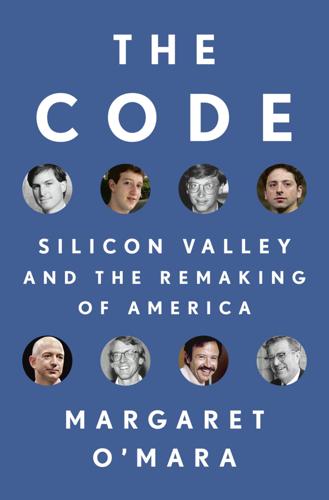
The Code: Silicon Valley and the Remaking of America
by
Margaret O'Mara
Published 8 Jul 2019
For example, the state’s civil code prohibited enforcement of non-compete clauses in employment contracts, a prohibition that didn’t have a thing to do with the intellectual property or trade secrets of the electronics industry, but instead came into being in 1870, as the state’s early lawmakers attempted to reconcile the chaotic jumble of legal regimes—Spanish, Mexican, Anglo-American—that had ruled the state. But the result of this provision helped facilitate the job-hopping that became a hallmark of the Valley’s tech community. If an engineer left his job and jumped to a direct competitor, his old employer couldn’t do anything about it, even though the employee’s tacit knowledge could be a tech company’s most valuable asset. Massachusetts, in contrast, enforced these clauses.
…
They remained men of the electronics lab, too, choosing their hires on the basis of who was “smart” and priding themselves on their commitment to meritocracy. Yet Valley “meritocracy” also placed great value on known quantities: people who came from familiar, top-ranked engineering programs, or who had worked at familiar local companies, or whose references came from known and trusted sources. The high degree of job-hopping between companies facilitated this, creating a mobile workforce that often worked in a series of different enterprises, sometimes with the same managers and colleagues. The hiring habits set in place by the semiconductor companies continued over the Valley’s successive technological generations.
…
Japan’s surge opened up a rift between Silicon Valley and the rest—reflecting fundamentally different ecosystems and ways of doing business that separated the Californians from their competitors in other parts of the country. The leading Valley firms had never strayed far from their stripped-down start-up roots. The idea that technology would stay within one company went against the grain. When talented engineers job-hopped, aided by those California non-compete laws, technology often came with them. It was “a structure that allows a hundred flowers to bloom,” as Intel’s Andy Grove put it: entrepreneurs leaving bigger firms to start their own companies. But start-ups didn’t have the bandwidth to do next-generation research.

Be Obsessed or Be Average
by
Grant Cardone
Published 20 Sep 2016
According to Gallup’s study: Steve Crabtree, “Worldwide, 13% of Employees Are Engaged at Work,” Gallup.com, October 8, 2013, www.gallup.com/poll/165269/worldwide-employees-engaged-work.aspx. A 2012 Forbes study: Jeanne Meister, “Job Hopping Is the ‘New Normal’ for Millennials: Three Ways to Prevent a Human Resource Nightmare,” Forbes.com, August 14, 2012, www.forbes.com/sites/jeannemeister/2012/08/14/job-hopping-is-the-new-normal-for-millennials-three-ways-to-prevent-a-human-resource-nightmare/#78b9d0485508. A PayScale report: “Gen Y on the Job,” PayScale.com, www.payscale.com/gen-y-at-work. A 2013 survey by: Dan Schawbel, “Millennial Branding and Beyond.com Survey Reveals the Rising Cost of Hiring Workers from the Millennial Generation,” August 6, 2013, millennialbranding.com/category/blog/page/4/.

Augmented: Life in the Smart Lane
by
Brett King
Published 5 May 2016
Your 20s are used as the time where you actually figure out what you want to do, so the constant job hopping to explore multiple industries is expected.” Emily He, CMO of Saba22 Some of this is borne out of simple necessity. Millennials are generally more educated than their predecessors, but the impact of the 2008 financial crisis (the Great Recession) resulted in them being hit particularly hard on the job front, with 30 per cent of men and 37 per cent of women unemployed or not in the labour force.23 This has driven a pragmatic approach to work, and technology and real-time engagement are underpinning the job-hopping and gigging that Millennials are becoming known for.
…
Today, 8 million people are employed in renewable energy, but estimates predict that as many as 37 million people globally will be employed in this industry by 2030. This is not a future consideration as jobs in the US domestic solar energy industry grew nearly 12 times faster than the overall economy did in 2015 according to a survey by The Solar Foundation. Gigging, Job-hopping and Cloud-based Employment It was recently reported by Mintel that almost a quarter of Millennials would like to start their own businesses, and nearly one in five planned to do so in the next 12 months.17 In markets like the United States or Australia where the cost of college education is becoming either unattainable or a poor investment for large swathes of the population, many of this generation are choosing instead to be educated by online platforms, hackathons, internships, start-ups and experimentation rather than through traditional college approaches.
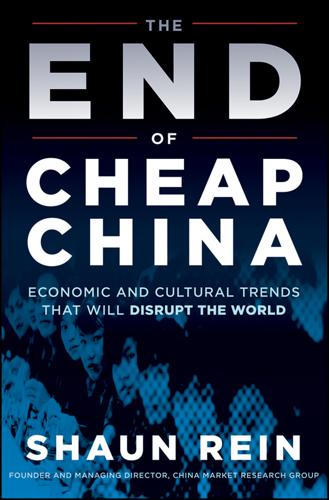
The End of Cheap China: Economic and Cultural Trends That Will Disrupt the World
by
Shaun Rein
Published 27 Mar 2012
Investment banks like Goldman Sachs are increasing their business in China even as they pare their ranks in New York and London. The result is massive competition among employers to hire workers in China—even at the height of the financial crisis, when billionaire investor Warren Buffett declared that America’s economy had fallen off a cliff. It has become so easy for workers to find jobs elsewhere that they job-hop constantly. Desperate for warm bodies, companies are throwing 20 percent or greater salary increases at workers to steal them from other firms, creating huge paydays for executive recruiters and headaches for general managers. Bob’s human resource problems are mirrored in company after company. My firm conducted interviews in 2010 with human resource managers and senior executives at Fortune 500 companies.
…
It is even rumored that all-powerful former Prime Ministers Li Peng and Zhu Rongji have been prevented from publishing memoirs. These restrictions and contingencies show the importance the Party places on ensuring harmony and limiting the power of one individual to disturb society. Rules that limit officials’ job hopping from the public to the private sector also ensure that decisions are in the country’s best interests rather than for their personal future financial gains. Recall American officials such as former Secretary of the Treasury Robert Rubin or Vice President Dick Cheney, who ended up managing or lobbying for the industries or companies like Citigroup and Halliburton that they previously oversaw during their time in government.
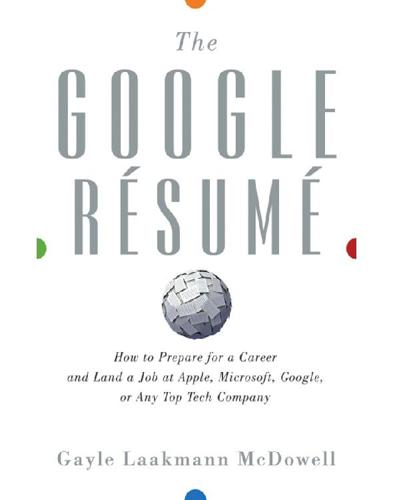
The Google Resume: How to Prepare for a Career and Land a Job at Apple, Microsoft, Google, or Any Top Tech Company
by
Gayle Laakmann Mcdowell
Published 25 Jan 2011
If you are unsure, ask your interview coordinator what position your interviewer has. What Happens? The HR screener will likely ask questions to evaluate your character, background, and basic intelligence. Any skill-specific questions should be at a cursory level. Questions may also be designed to probe any potential red flags, such as frequent job hopping. These interviews are usually conducted over the phone, but may also employ video chat or computer tests. How to Do Well In addition to the usual guidance for interviews, consider this advice: Look for red flags. A core goal of the HR screening interview is to evaluate any potential red flags on your résumé.
…
You are given 31 dominoes, and a single domino can cover exactly two squares. Can you use the 31 dominos to cover the entire board? Answering the Tough Questions Sometimes, the toughest questions are the ones we already know and don’t want to answer. Maybe it’s a layoff, maybe it’s a pattern of job hopping, or maybe it’s a sudden career switch. No matter how much we don’t want to get these questions, we must be prepared for them. Practice your story for this, both to yourself out loud and to your friends. Does it appear honest and credible? Are you prepared for any follow-up questions that your interviewer might ask?
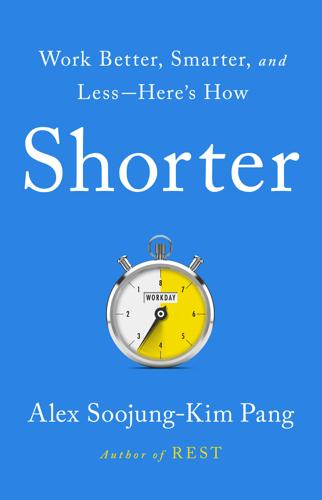
Shorter: Work Better, Smarter, and Less Here's How
by
Alex Soojung-Kim Pang
Published 10 Mar 2020
It’s more about quality of work than time. That’s what the training’s all about. With us it’s about knowing your product, knowing your brand, knowing your market space, and positioning yourself correctly to do that so you get more meaningful engagement. That’s the key.” Glasgow is Europe’s call-center capital and has a “culture of job hopping,” as people jump to new companies in pursuit of higher salaries and bonuses. Lorraine realized “if we were going to invest in that training, we didn’t want them leaving six months later.” By early 2016, they had grown to fifty people and added a variety of perks to keep them: gym classes, free breakfast, a wellness coach and personal trainer, even a company-wide vacation to Tenerife during the depths of the Scottish winter.
…
They value their own time and have enough experience to appreciate what the four-day workweek says about how the company is run and where it directs its ambition. For them, a shorter workweek can be just as appealing as a higher salary. FOUR-DAY WEEKS DECREASE TURNOVER After they implemented a four-day week in 2015, Pursuit Marketing’s annual turnover rate dropped to 2 percent, a remarkably low figure in an industry where job-hopping is common. Not only has that helped keep productivity high and justified their higher-than-average investment in employee training, it’s also saved the company more than a quarter million pounds on recruitment. In Glasgow, corporate recruiters usually charge about £4,000 to hire a single telemarketer; thanks to the four-day week, the company was able to grow from 50 to 120 people without paying any recruitment fees at all.
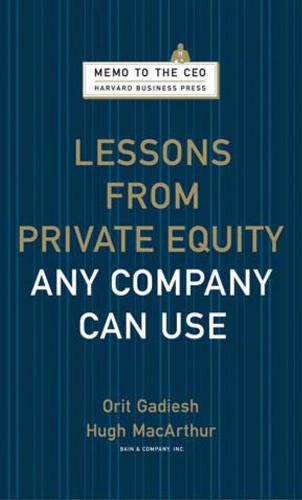
Lessons From Private Equity Any Company Can Use
by
Orit Gadiesh
and
Hugh MacArthur
Published 14 Aug 2008
In developing markets (such as in India), the list also will include background diligence on the senior management who are likely to stay. 8. See Chris Bierly, Graham Elton, and Chul-Joon Park, “Private Equity’s New Path to Profits,” Bain Brief, December 2006. 9. See Geoffrey Cullinan, Jean-Marc Le Roux, and Rolf-Magnus Weddigen, “When to Walk Away from a Deal,” Harvard Business Review, April 2004. 10. Eric Dash, “Job-hopping,” New York Times, July 20, 2007. 11. See Sunny Yi and Chul-Joon Park, “Turbocharging Asian Turnarounds,” Harvard Business Review, June 2006. 12. Paul Rogers, Tom Holland, and Dan Haas, “Value Acceleration Lessons from the Private Equity Masters,” Harvard Business Review, June 2002. 13. For more on RAPID, see Paul Rogers and Marcia Blenko, “Who Has the D?
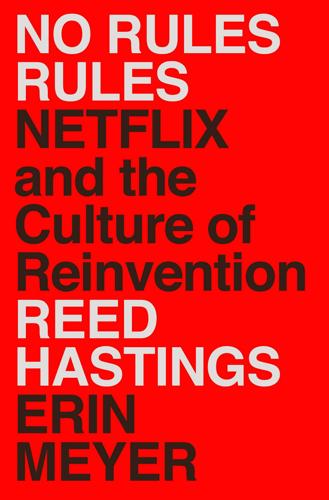
No Rules Rules: Netflix and the Culture of Reinvention
by
Reed Hastings
and
Erin Meyer
Published 7 Sep 2020
Monster. www.monster.com/career-advice/article/switch-jobs-earn-more-0517. Lucht, John. Rites of Passage at $100,000 to $1 Million+: Your Insider’s Strategic Guide to Executive Job-Changing and Faster Career Progress. New York: The Viceroy Press, 2014. Luthi, Ben. “Does Job Hopping Increase Your Long-Term Salary?” Chime. October 4, 2018. www.chimebank.com/2018/05/07/does-job-hopping-increase-your-long-term-salary. Sackman, H., et al. “Exploratory Experimental Studies Comparing Online and Offline Programing Performance.” Communications of the ACM 11, no. 1 (January 1968): 3–11. https://dl.acm.org/doi/10.1145/362851.362858.
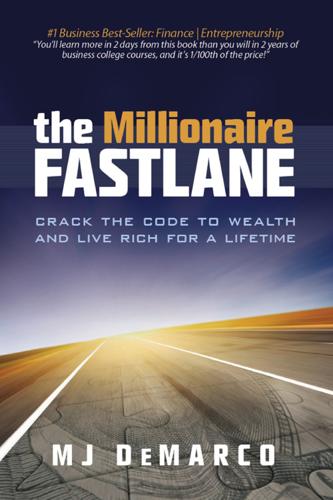
The Millionaire Fastlane: Crack the Code to Wealth and Live Rich for a Lifetime
by
Mj Demarco
Published 8 Nov 2010
Behind limited leverage is another corrosive wealth killer-no control. Can you control your employer? Can you control your salary? Can you control the economy? Can you earn $50,000 one year and next year bank $50 million? Can you control anything about your job, including your measly 4% pay raise? You might think you can by job-hopping, but you can't. Control is weak, if not absent. Compound Interest: What “They” Don't Tell You The second variable in the Slowlane wealth equation is the “primary wealth accelerator,” which comes from market investments like mutual funds, 401(k)s, and other traditional investments touted by gurus and financial advisers.
…
Unfortunately, this quickly turns Slowlane life into a stale exhibition of misery. Yes, settle for less. Wealth Fail: Wrong Equation. Wrong Variable At some point, the Slowlaner realizes he can't force the stock market to yield bigger returns. He can't force a 200% pay raise. He can't afford an advanced education to raise intrinsic value. Job-hopping offers little incremental pay upgrades. The Slowlaner is enslaved to his equation and resorts to manipulating the only controllable variable, personal net income, which is increased by reducing expenses. Personal Net Income = Intrinsic Value – Personal Expenses Slowlane gurus praise this strategy.

Factory Girls: From Village to City in a Changing China
by
Leslie T. Chang
Published 6 Oct 2008
I DON’T BELIEVE IT I ABSOLUTELY DON’T BELIEVE IT Wu Chunming, you cannot go on living every day like this! Think about it: You have already been at this factory an entire half year, but what have you really gained? You know that to do migrant work in the plastic molds department for your whole life does not have any prospects, so you want to job-hop and find a satisfactory job. First you must learn to speak Cantonese. Why are you so useless? Are you truly so stupid? Why can’t you learn the things other people learn? You are also a person, Wu Chunming. Can it be that you are a useless thing? You have already had more than two months but made no progress in Cantonese.
…
The return to the village to celebrate the lunar new year in late winter is the central event of the migrant calendar—in the six weeks around the holiday, almost 200 million people travel on China’s trains. As the new year approaches, the impending journey becomes the main preoccupation of the factory world. Job-hopping stops as workers focus on saving money to return in style. Couples enter delicate negotiations: Whose family will they visit and what is the status of their relationship? This reckoning can be painful, and migrants unhappy with their lot may decide not to go home at all. The holiday is the hinge on which the whole year turns—it is the time to quit a job, take a rest, get engaged, start again.
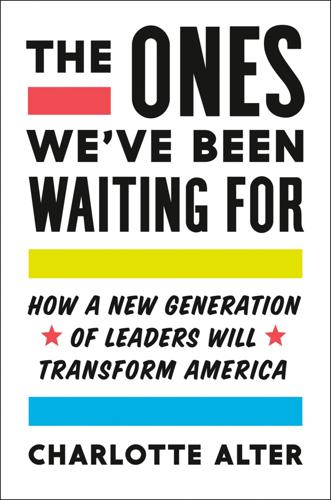
The Ones We've Been Waiting For: How a New Generation of Leaders Will Transform America
by
Charlotte Alter
Published 18 Feb 2020
Since the Great Recession,” Pew Research Center, November 1, 2017, pewresearch.org/fact-tank/2017/11/01/how-wealth-inequality-has-changed-in-the-u-s-since-the-great-recession-by-race-ethnicity-and-income/. other sources of income: Hobbes, “FML: Why Millennials Are Facing the Scariest Financial Future of Any Generation Since the Great Depression.” their student loan payments: Amy Adkins, “Millennials, The Job Hopping Generation,” Gallup, n.d., gallup.com/workplace/231587/millennials-job-hopping-generation.aspx. halved since 1983: Bureau of Labor Statistics, “Union Membership in the United States,” September 2016, bls.gov/spotlight/2016/union-membership-in-the-united-states/home.htm. schedules just a few days in advance: Lonnie Golden, “Irregular Work Scheduling and Its Consequences,” Economic Policy Institute, April 9, 2015, epi.org/publication/irregular-work-scheduling-and-its-consequences/.

Seriously Curious: The Facts and Figures That Turn Our World Upside Down
by
Tom Standage
Published 27 Nov 2018
Millennial Americans are just as loyal to their employers as previous generations It is often claimed that millennials (people born between 1982 and 1999) are fickle employees, changing jobs frequently and reluctant to commit themselves to a single employer for the long term. Millennials are indeed more likely to switch jobs than their older colleagues. But that is more a result of how old they are than of the era they were born in: young people at the start of their working lives have always job-hopped more than older people who are more established in their careers. In America at least, average job tenures have barely changed in recent decades. Data from America’s Bureau of Labour Statistics show that workers aged 25 and over now spend a median of 5.1 years with their employers, slightly more than in 1983 (see chart).
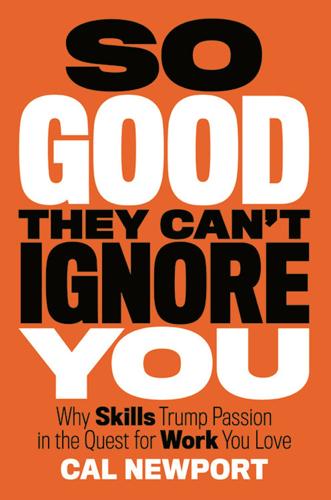
So Good They Can't Ignore You: Why Skills Trump Passion in the Quest for Work You Love
by
Cal Newport
Published 17 Sep 2012
The more I studied the issue, the more I noticed that the passion hypothesis convinces people that somewhere there’s a magic “right” job waiting for them, and that if they find it, they’ll immediately recognize that this is the work they were meant to do. The problem, of course, is when they fail to find this certainty, bad things follow, such as chronic job-hopping and crippling self-doubt. We can see this effect in the statistics. As I just established, the last several decades are marked by an increasing commitment to Bolles’s contagious idea. And yet, for all of this increased focus on following our passion and holding out for work we love, we aren’t getting any happier.
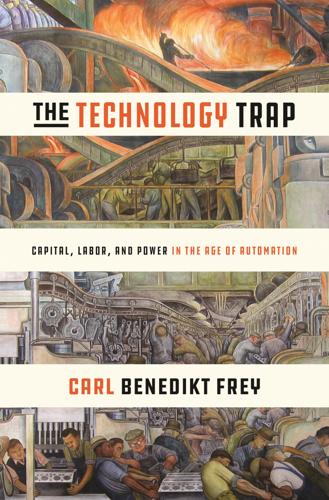
The Technology Trap: Capital, Labor, and Power in the Age of Automation
by
Carl Benedikt Frey
Published 17 Jun 2019
On occupational licensing and nonemployment among men in their prime, see B. Austin, E. L. Glaeser, and L. Summers, forthcoming, “Saving the Heartland: Place-Based Policies in 21st Century America,” Brookings Papers on Economic Activity. 45. B. Fallick, C. A. Fleischman, and J. B. Rebitzer, 2006, “Job-Hopping in Silicon Valley: Some Evidence Concerning the Microfoundations of a High-Technology Cluster,” Review of Economics and Statistics 88 (3): 472–81. 46. R. J. Gilson, 1999, “The Legal Infrastructure of High Technology Industrial Districts: Silicon Valley, Route 128, and Covenants Not to Compete,” New York University Law Review 74 (August): 575. 47.
…
Blau, and S. Thrun. 2017. “Dermatologist-Level Classification of Skin Cancer with Deep Neural Networks.” Nature 542 (7639): 115–18. Eveleth, P., and J. M. Tanner. 1976. Worldwide Variation in Human Growth. Cambridge: Cambridge University Press. Fallick, B., C. A. Fleischman, and J. B. Rebitzer. 2006. “Job-Hopping in Silicon Valley: Some Evidence Concerning the Microfoundations of a High-Technology Cluster.” Review of Economics and Statistics 88 (3): 472–81. Farber, H. S., D. Herbst, I. Kuziemko, and S. Naidu. 2018. “Unions and Inequality over the Twentieth Century: New Evidence from Survey Data.” Working Paper 24587, National Bureau of Economic Research, Cambridge, MA.

Swimming With Sharks: My Journey into the World of the Bankers
by
Joris Luyendijk
Published 14 Sep 2015
There were countless stories of entire teams being poached, moving from one bank to another and sometimes back again – by which time everybody in the team is making vastly more than they did before the merry-go-round started. The recruiters I spoke to confirmed that in the City this system of job-hopping is the norm, even more so in the boom years before 2008. A recruiter with over a decade of experience became a regular contact. His favourite lunch place was a traditional English pub in the historical heart of the Square Mile. We chatted away over a pint and I got to grips with steak and kidney pudding.

The Rum Diary
by
Hunter S. Thompson
Published 1 Jan 1998
And Schwartz was not that way. He was perfectly capable of doing a strange and irregular thing, but only if he'd planned it Anything done on the spur of the moment was not only stupid, but immoral. Like going to the Caribe without a tie. He viewed Moberg's way of life as a criminal shame and called him that job-hopping degenerate. I knew it was Schwartz who had put into Lotterman's head the idea that Moberg was a thief. Sala looked up at me. Schwartz is afraid they'll cut off his credit at the Marlin and he'll lose that special seat at the end of the bar -- the one they save for the dean of the white journalists.
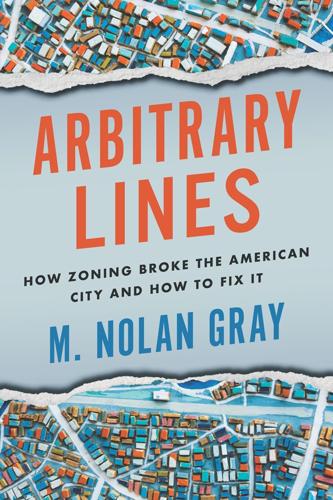
Arbitrary Lines: How Zoning Broke the American City and How to Fix It
by
M. Nolan Gray
Published 20 Jun 2022
But in a metropolitan area with a robust energy sector—such as Houston—there may be multiple firms who could make full use of their skills, bidding up their wages and allowing them to further specialize. With so many options, the young engineer—or designer, or doctor, or accountant—can easily find the position where they can create the most value, job-hopping until they find the perfect fit.6 Scale this up a few million times, and you can see how the large labor markets that cities host can make us collectively more productive. A simplified 3D density gradient of metropolitan San Antonio. Note how even in a city known for its sprawl, densities peak around a central business district and rapidly fall extending outward, with the exception of satellite employment centers.

The Snowden Files: The Inside Story of the World's Most Wanted Man
by
Luke Harding
Published 7 Feb 2014
He goes on: ‘Europe posts are competitive, but you can get in the door much easier if you express an interest in going to near-east hellholes. Once you’re in, tough out the crappy tour and you should be able to pick from a list of preferred posts.’ Later he remarks, ‘Thank god for wars.’ Snowden’s job-hopping worked for him personally. In 2007 the CIA sent him to Geneva in Switzerland on his first foreign tour. He was 24. His new job was to maintain security for the CIA’s computer network and look after computer security for US diplomats based at the Geneva mission (the diplomats may have been high-powered but many had only a basic understanding of the internet).
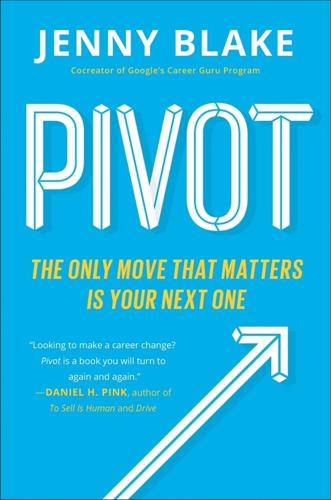
Pivot: The Only Move That Matters Is Your Next One
by
Jenny Blake
Published 14 Jul 2016
I do not believe in resigning yourself to a subpar working life just because friends and family (whose top priority is often to keep us safe) or society tells us so. It would be a mistake to assume that everyone should follow one path or the other, or to judge one as categorically better or worse. A Pivot mindset is not one that proposes reckless job hopping by quitting a job or folding a business at the first sign of displeasure. Rather, it emphasizes shifting naturally within your role and from one position into the next, while remaining open to a wide variety of options along the way. Many people dip in and out of self-employment. Sometimes they work entirely for themselves or with partners, sometimes they take on longer-term consulting work with bigger companies, and sometimes they go back to work in other organizations full or part time.
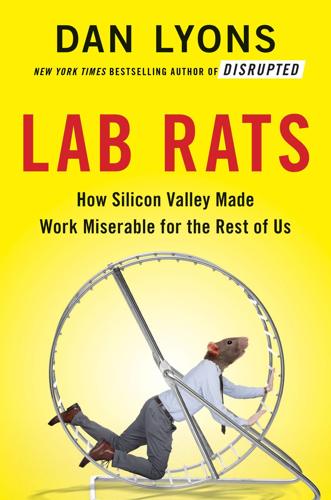
Lab Rats: How Silicon Valley Made Work Miserable for the Rest of Us
by
Dan Lyons
Published 22 Oct 2018
O’Donovan, Caroline, and Priya Anand. “How Uber’s Hard-Charging Corporate Culture Left Employees Drained.” BuzzFeedNews, July 17, 2017. https://www.buzzfeed.com/carolineodonovan/how-ubers-hard-charging-corporate-culture-left-employees. Overfelt, Maggie. “Millennial Employees Are a Lot More Loyal than Their Job-Hopping Stereotype.” CNBC, May 10, 2017. https://www.cnbc.com/2017/05/10/90-of-millennials-will-stay-in-a-job-for-10-years-if-two-needs-met.html. Reyes, Emily Alpert. “Millennials Value Job Security More than Baby Boomers Do, Survey Says.” Los Angeles Times, December 10, 2013. http://articles.latimes.com/2013/dec/10/business/la-fi-mo-survey-millennials-job-security-20131210.
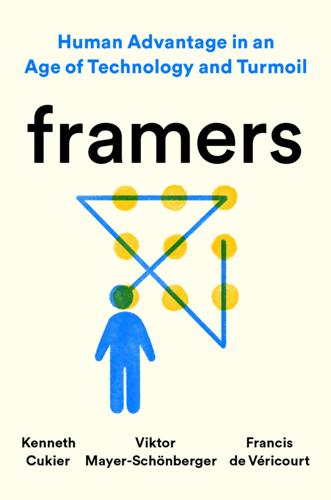
Framers: Human Advantage in an Age of Technology and Turmoil
by
Kenneth Cukier
,
Viktor Mayer-Schönberger
and
Francis de Véricourt
Published 10 May 2021
In contrast, Silicon Valley was home to a flourishing network of small, nimble firms that competed against one another and actively searched for new ideas. There were no domineering players, start-ups were decentralized, and risk-taking was respected. Competition amounted to lots of small experiments that made everyone smarter. Workers from different firms met outside the office to share ideas, and the labor market encouraged job hopping, letting companies draw on a fuller set of frames from employees. The result was that fragmented Silicon Valley was more innovative and efficient than conformist East Coast firms. According to the economic historian Joel Mokyr and the anthropologist Jared Diamond, a similar situation unfolded in the economic competition between China and Europe over the past roughly two thousand years.
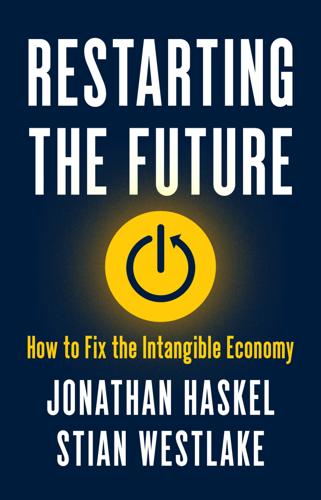
Restarting the Future: How to Fix the Intangible Economy
by
Jonathan Haskel
and
Stian Westlake
Published 4 Apr 2022
In addition, in recent years economists have documented an increase in the markup between prices and marginal costs that firms appear to be earning (figure 1.5).13 This work is nicely summarised in an excellent book, The Great Reversal, by the economist Thomas Philippon.14 At the level of individual workers, the data show signs of declining dynamism. Contrary to popular myths about job-hopping millennials, younger workers change employers significantly less frequently than previous generations did. They are also less likely to move from one city to another for work. Economist Tyler Cowen describes these tendencies as symptoms of an emerging “complacent class” that is “working harder than ever to postpone change.”15 FIGURE 1.5: Average Global Markup, 2000–2015.
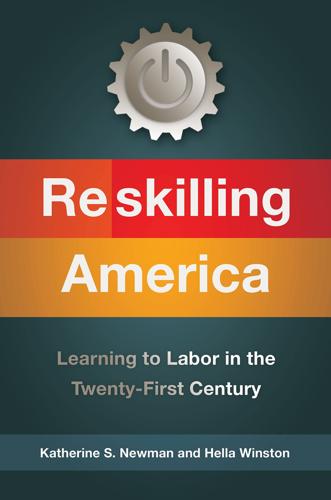
Reskilling America: Learning to Labor in the Twenty-First Century
by
Katherine S. Newman
and
Hella Winston
Published 18 Apr 2016
This can be productive if it yields an effective match after a few years and young workers begin to move up career ladders. But Osterman’s research showed that a sizable proportion of young people, especially low-skilled men of color, were unable to settle down into stable work. Their patterns of job hopping turned out not to be beneficial, but instead to signal to employers that these workers were unstable and hence bad bets. Interest in how other countries solved this problem began to grow in the wake of the recession in the 1980s. Sociologists like Northwestern University’s James Rosenbaum trained an eye on the Japanese school system, which seemed able to step into the breach and create a more effective matching system.
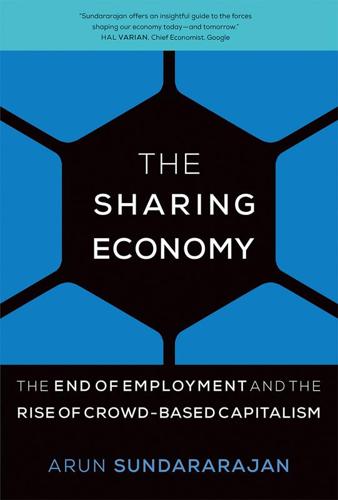
The Sharing Economy: The End of Employment and the Rise of Crowd-Based Capitalism
by
Arun Sundararajan
Published 12 May 2016
Alexander Tuzhilin and Gedas Adomavicius, ”Toward the next Generation of Recommender Systems: A Survey of the State-of-the-Art and Possible Extensions,” IEEE Transactions on Knowledge and Data Engineering 17, 6 (2006): 734–739. http://ieeexplore.ieee.org/xpls/abs_all.jsp?arnumber=1423975&tag=1. 18. Prasanna Tambe and Lorin M. Hitt, “Job Hopping, Information Technology Spillovers, and Productivity Growth,” Management Science 60, 2 (2013): 338–355. 19. One might instead consider using the term “efficiency” of capital or “productivity” of capital. However, these words have specific (and somewhat distinct) meanings in economics that don’t fully capture what I’m trying to communicate. 20.
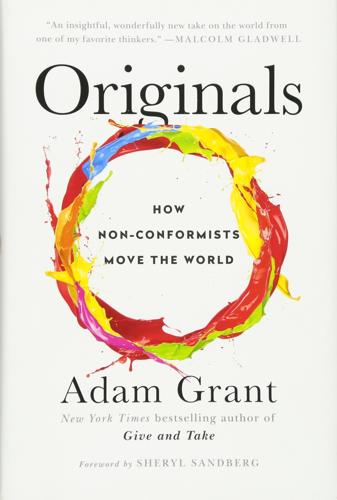
Originals: How Non-Conformists Move the World
by
Adam Grant
Published 2 Feb 2016
Finding the Faults in Defaults Not long ago, economist Michael Housman was leading a project to figure out why some customer service agents stayed in their jobs longer than others. Armed with data from over thirty thousand employees who handled calls for banks, airlines, and cell-phone companies, he suspected that their employment histories would contain telltale signs about their commitment. He thought that people with a history of job-hopping would quit sooner, but they didn’t: Employees who had held five jobs in the past five years weren’t any more likely to leave their positions than those who had stayed in the same job for five years. Hunting for other hints, he noticed that his team had captured information about which internet browser employees had used when they logged in to apply for their jobs.

Truths, Half Truths and Little White Lies
by
Nick Frost
Published 7 Oct 2015
The restaurant didn’t seem enough, it was basically all I knew but I just couldn’t do it any more, so I left. There was no fanfare. I just left. Five years. Goodbye. I knew I’d only leave to go to another restaurant but it felt good anyway. It was positive. After five years of stability now came a time of job-hopping. Moving from restaurant to restaurant. Work was no longer the most important thing in my life, it was raving and comedy and Simon and Smiley and my mate Danny and Maxwell and all the other new people I’d met who’d enflamed my throbbing art gland. That took money though. I think if the truth were told I was a little bit embarrassed that I had to wait tables while my new mates did comedy.

The Golden Passport: Harvard Business School, the Limits of Capitalism, and the Moral Failure of the MBA Elite
by
Duff McDonald
Published 24 Apr 2017
“They leave not so much because the grass is greener on the other side of the fence,” wrote Livingston, “but because it is definitely brown on their side.” Knocking the legs out from under the explanation that job-hopping was motivated by the availability of a higher salary elsewhere, Livingston also cited surveys of HBS classes that indicated that men who stayed with their first employer tended to earn more than those who didn’t. More often than not, job-hopping was a sign of arrested career progress and nothing more. HBS has always emphasized that the case method imbues in its students a bias to action, and a peerless ability to make decisions under time pressure and with incomplete information.

Janesville: An American Story
by
Amy Goldstein
Published 17 Apr 2017
What amazes her most is the avalanche of a realization she is having that, if this room exists behind the door that Mrs. Venuti has unlocked for her, that must mean that other kids at Parker are from families whose situations are not the greatest either. Hard as it is to imagine, in Janesville where thousands of people have lost jobs and some are still out of work and some, like her dad, are job hopping and not earning enough money, it has never occurred to Kayzia before that what is going on in her family is going on all over town. That is what happens when she and Alyssa have decided that this is not a subject to discuss with friends, and other kids, who used to be middle-class, too, have decided the same thing.

Permanent Record
by
Edward Snowden
Published 16 Sep 2019
After the 2013 revelations, the US government would try to disparage me by referring to me as “only a contractor” or “a former Dell employee,” with the implication that I didn’t enjoy the same kinds of clearance and access as a blue-badged agency staffer. Once that discrediting characterization was established, the government proceeded to accuse me of “job-hopping,” hinting that I was some sort of disgruntled worker who didn’t get along with superiors or an exceptionally ambitious employee dead-set on getting ahead at all costs. The truth is that these were both lies of convenience. The IC knows better than anyone that changing jobs is part of the career track of every contractor: it’s a mobility situation that the agencies themselves created, and profit from.

The End of Power: From Boardrooms to Battlefields and Churches to States, Why Being in Charge Isn’t What It Used to Be
by
Moises Naim
Published 5 Mar 2013
Like many authoritarian countries, China has a system of official labor unions that are part of the overall Communist Party architecture, less vehicles for worker demands and benefits than agencies that contribute to social control. Therefore, rather than attempt collective bargaining, individual workers have responded to poor conditions by job-hopping. And the young labor force typically works in the factories for a number of years only in order to prepare for marriage or send money home. But Chinese plant workers have taken increasingly bold—and effective—collective actions to demand better treatment from their employers while bypassing the irrelevant official union structure.
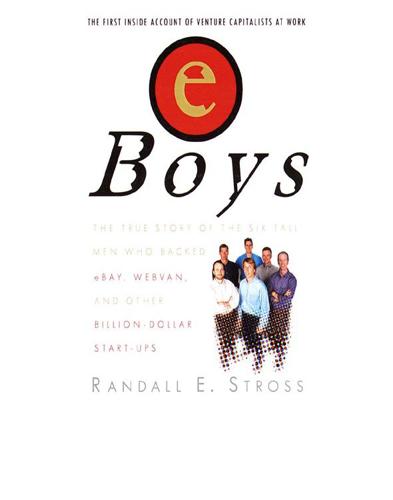
eBoys
by
Randall E. Stross
Published 30 Oct 2008
Now, in the fall of 1997, Ramsey Beirne called her in Brookline, Massachusetts, to tell her about a great company that happened to be an Internet start-up located in San Jose. Would she be interested in having a look? She was happy at Hasbro and had been there only a year, too short a time to countenance another job hop. Her husband, a neurosurgeon who directed the brain-tumor program at Massachusetts General, had his own dream job and was not interested in a move. Her two kids were settled in their schools. She told Ramsey Beirne thanks, but no thanks. Three weeks later Alan Seiler called her back. “I’ve been talking to Dave Beirne,” he said, “and he says you are perfect for this job.
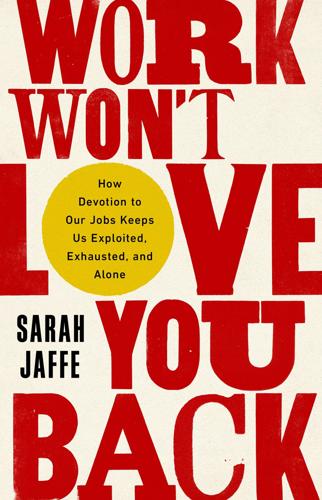
Work Won't Love You Back: How Devotion to Our Jobs Keeps Us Exploited, Exhausted, and Alone
by
Sarah Jaffe
Published 26 Jan 2021
Privatization, as Fisher noted, has brought with it the privatization of stress, the proliferation of depression, and a rise in anxiety. If you cannot get a job, it must be because you failed to do enough (unpaid) work to acquire the correct skills; if you get that job and it makes you miserable, just get another! Such discourse justifies the constant job-hopping that provides companies with what they want: just-in-time labor, easily hired and fired, easily controlled. 21 There’s another famous Thatcherism for this process, usually paraphrased as “There is no such thing as society,” though what she actually said was: “… who is society? There is no such thing!

In Spite of the Gods: The Rise of Modern India
by
Edward Luce
Published 23 Aug 2006
These are monthly deductions from your bank account that continue for years, enabling you to pay off the car, motorbike, microwave, freezer, air-conditioning units, and flats that you have not yet earned. You can even take an EMI holiday. Most go to Thailand or the Maldives. “Holiday now, pay later,” says the commercial. Alok also provides stock options, as an incentive for employees to stick around until the company is listed on the stock market, in a world where people are constantly job hopping—another novelty for India where a secure job is conventionally something you cling to for life. But stock options are not much incentive for an employee who slices up his or her (almost half of Alok’s employees are female) income into exact bytes of EMI. “Saving is the last thing on these guys’ [his employees] minds,” Alok said.
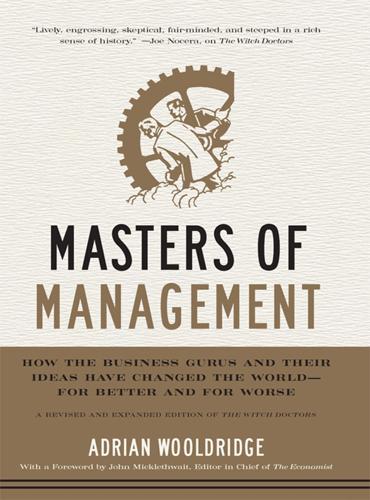
Masters of Management: How the Business Gurus and Their Ideas Have Changed the World—for Better and for Worse
by
Adrian Wooldridge
Published 29 Nov 2011
Booz & Company, a consultancy, calculates that four out of every five CEO appointments go to insiders, and insiders last almost two years longer in their jobs than outsiders. Both Edward Dolman, the chairman and former CEO of Christie’s, and Jim Skinner, the CEO of McDonald’s, started on the ground floor and worked their way up. Job hopping is seldom the path to the top. And what happens if all this loyalty and networking pays off? How do you keep hold of power once you get your hands on it? The old saw about power corrupting has been laboriously confirmed by academic studies of everything from risk-taking to cookie-eating (powerful people are more likely to eat with their mouths open and to scatter crumbs over their faces, researchers have discovered).

Triumph of the City: How Our Greatest Invention Makes Us Richer, Smarter, Greener, Healthier, and Happier
by
Edward L. Glaeser
Published 1 Jan 2011
A classic study by two economists found that unemployment rates were almost 3 percent higher in the downturns of the 1970s and 1980s in places that lacked a diverse range of employers. The sheer variety of urban jobs also allows people to figure out what they can and can’t do well. For millennia, most humans toiled on farms regardless of whether or not they had any aptitude for tilling the soil. In a city, people can hop from firm to firm and industry to industry. As people job-hop, they learn what they like and can do well. How much would the world have lost if Thomas Edison or Henry Ford had been forced to spend all his days farming? Rio’s Favelas Rio’s shantytowns began in the late nineteenth century, when Brazil was lurching out of its quasi-feudal past. In the 1870s and 1880s, when other New World countries, like Argentina and the United States, elected their rulers, Brazil was ruled by an emperor, a scion of Portugal’s ancient house of Braganza, and slavery was still legal.
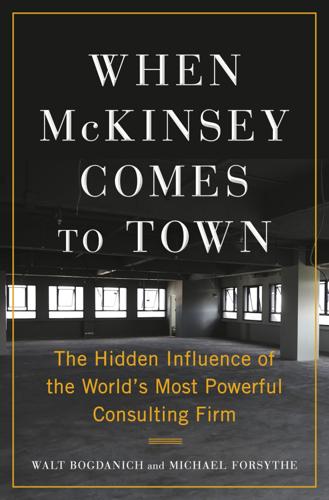
When McKinsey Comes to Town: The Hidden Influence of the World's Most Powerful Consulting Firm
by
Walt Bogdanich
and
Michael Forsythe
Published 3 Oct 2022
The fealty of corporations to Wall Street meant job security became less important. “It was the corporate downsizing of the late 1980s that first broke the traditional covenant that traded job security for loyalty,” three McKinsey consultants wrote in their book, The War for Talent. “Within a few short years, the old taboos against job hopping had evaporated and it had become a badge of honor to have multiple companies on one’s resumé.” The book included charts with statements like this one: “The old reality: Employees are loyal. The new reality: People are mobile and their commitment is short term.” McKinsey’s attitude toward job security is reflected in its own, up-or-out practice, where each individual is regularly reevaluated and those who fail to impress are, in McKinsey’s parlance, counseled to leave.

Wealth and Poverty: A New Edition for the Twenty-First Century
by
George Gilder
Published 30 Apr 1981
Galbraith lauds the controls of the Korean War period, though price limits were irrelevant at a time when many prices were actually declining as a result of restrictive fiscal and monetary policy. Neither of our economists faced the profoundly perverse impact of controls, particularly on the crucial group of fast-growing technological enterprises afflicted by job-hopping technicians and engineers, or considered the other destructive effects of price limits on investment and productivity. The controls, in fact, would be likely in the end to enhance inflationary pressures rather than relieve them, because productivity, but not the money supply, would decline. It is not merely the futility of the programs, however, that signifies the end of an era.
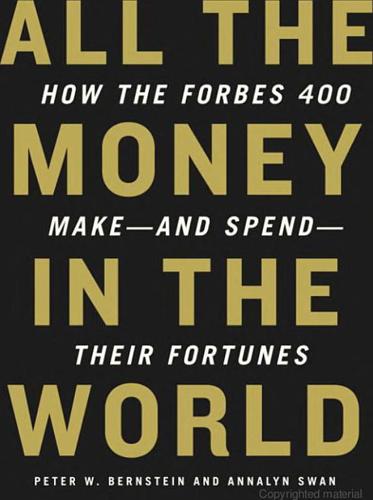
All the Money in the World
by
Peter W. Bernstein
Published 17 Dec 2008
The Valley’s relatively contained geography20 provided more opportunities for people who worked there to form professional and social networks, according to AnnaLee Saxenian, author of Regional Advantage: Culture and Competition in Silicon Valley and Route 128. Back on the East Coast, loyalty to the individual firm was more the norm, whereas on the West Coast spin-off companies and job-hopping were standard practice. “From the outset21 Silicon Valley’s pioneers saw themselves as outsiders to the industrial traditions of the East,” writes Saxenian. “There was a shared understanding that anyone could become a successful entrepreneur: there were no boundaries of age, status, or social stratum that precluded the possibility of a new beginning; and there was little embarrassment or shame associated with business failure.”
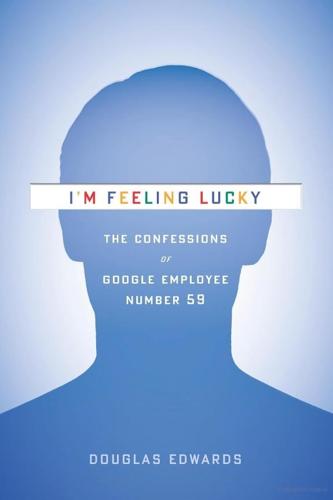
I'm Feeling Lucky: The Confessions of Google Employee Number 59
by
Douglas Edwards
Published 11 Jul 2011
Silicon Valley is a Petri dish filled with amoeba-like corporations absorbing and digesting smaller technology firms, only to find themselves absorbed or growing large enough to split off their own subsidiaries. Employers have a penchant for hiring from the same pool of candidates over and over again, so everyone ends up working with everyone else at some point, or at least working for the same companies. Job-hopping is encouraged—no, expected—since no one place could possibly be interesting and innovative enough for an entire career. That's why the question Sergey asked when he interviewed me for the job was not "Why do you want to leave the Mercury News?" but "Why did you wait so long?" No wonder social networking took root here; we're one big interconnected family whose members are always happy to find out how we're related to one another.

The Big Score
by
Michael S. Malone
Published 20 Jul 2021
Aeroneutronic was a frustrating experience for Amdahl. “At least I was in on the ground floor of that company, so even the government contracting work was more interesting,” he said. He also had a little equity in the firm—a lesson he should have learned better for later years. In September 1960, IBM hired Amdahl back. All of this job-hopping didn’t quite jibe with the fifties work philosophy, and it was especially difficult for Amdahl and his wife, now that they were towing along three young children (including Carlton). But now Amdahl was back in the warm bosom of IBM—and the company realized what a treasure they had let slip out of their hands.

The Rise of the Network Society
by
Manuel Castells
Published 31 Aug 1996
Anna Saxenian compared the development of electronics complexes in the two areas (Boston’s Route 128 and Silicon Valley) and concluded that the decisive role was played by the social and industrial organization of companies in fostering or stymieing innovation.65 Thus, while large, established companies in the East were too rigid (and too arrogant) to constantly retool themselves toward new technological frontiers, Silicon Valley kept churning out new firms, and practicing cross-fertilization and knowledge diffusion by job-hopping and spin-offs. Late-evening conversations at the Walker’s Wagon Wheel Bar and Grill in Mountain View did more for the diffusion of technological innovation than most seminars in Stanford. As I have elaborated elsewhere,66 another key factor in the formation of Silicon Valley was the existence of a network of venture capital firms early on.67 The significant factor here is that many of the early investors originated from the electronics industry, and thus they were knowledgeable about the technological and business projects on which they were betting.
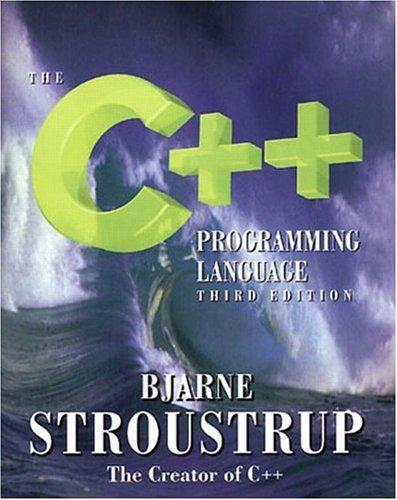
The C++ Programming Language
by
Bjarne Stroustrup
Published 2 Jan 1986
Disregard of such records – as is done when individuals are considered merely as interchangeable cogs in the wheels of an organization – leaves managers at the mercy of misleading quantity measurements. One consequence of taking a long-term view and avoiding the ‘‘interchangeable morons school of management’’ is that individuals (both developers and managers) need longer to grow into the more demanding and interesting jobs. This discourages job hopping as well as job rotation for ‘‘career development.’’ A low turnover of both key technical people and key managers must be a goal. No manager can succeed without a rapport with key designers and programmers and some recent and relevant technical knowledge. Conversely, no group of designers and developers can succeed in the long run without support from competent managers and a minimum of understanding of the larger nontechnical context in which they work.